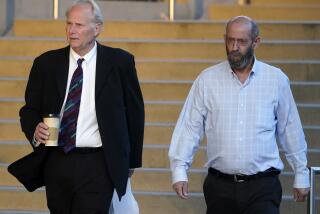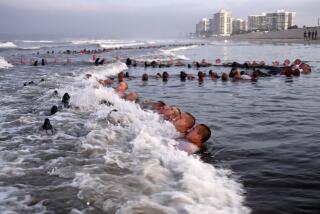Sailor Who Killed Gay Shipmate Had No Regret, Court Told
- Share via
YOKOSUKA, Japan — A sailor who killed a gay shipmate suffered child abuse in a broken home and hated homosexuals. He inflicted injuries as severe as if his victim had been killed in “a high-speed auto accident or low-speed airplane crash,” then told an investigator he’d do it again, a court-martial was told here Tuesday.
The testimony came before a jury of eight Navy and Marine officers who are charged with fixing punishment for Airman Apprentice Terry M. Helvey, 21.
The 6-foot, 4-inch weightlifter confessed in court May 3 that he beat to death Seaman Allen R. Schindler in a public toilet in Sasebo, Japan, last Oct. 27. Both sailors served aboard the amphibious assault ship Belleau Wood.
Helvey’s plea was made as part of a court-approved agreement that reduced the maximum sentence from death to life in prison.
Kennon F. Privette, a Navy investigator, testified that Helvey, during interrogation the day after the murder, admitted killing Schindler and said he “hated homosexuals. He was disgusted by them.”
“ ‘I don’t regret it. I’d do it again. . . . He deserved it,’ ” Privette quoted Helvey as telling him and Rayford Wallace Jr., another Navy investigator.
At another point in the interrogation, Helvey “said he had always wondered what it felt like to kill a man,” Privette said.
Neither investigator explained how Helvey knew that Schindler was gay. Schindler had told his commander of his sexual orientation and was awaiting discharge when he was killed.
An explanation of events before the beating in the toilet has yet to be offered in the court-martial.
Called as a defense witness, Dr. Robert Strayhan, chief of mental health at Yokosuka Air Base, testified that Helvey told him he had been using steroids.
“These drugs may have been used and may have influenced the level of violence,” Strayhan said.
Navy Cmdr. Edward Kilbane, a pathologist who conducted the autopsy on Schindler’s body, said Schindler suffered “the most severe injuries I’ve ever seen in a beating case” in nearly 1,000 autopsies. He compared Schindler’s injuries to those usually found in high-speed auto accidents.
Asked by Maj. Bernard Doyle, a defense attorney, if he thought the injuries were similar to what might be found in an assault by more than one person, Kilbane replied, “Yes.”
Dorothy Hajdys, Schindler’s mother, said she had been informed by two sailors who visited her home last October that her son “had been assaulted by two men.”
Virginia Helvey, the defendant’s mother, and Sheryl Sarchette, his aunt, described Helvey as a victim of child abuse who was born when his father, a heavy drug user, was in jail. Helvey was brutalized by a stepfather but nonetheless became a sports star and was elected president of his class one year in high school, they said, adding that he never got into trouble.
More to Read
Sign up for Essential California
The most important California stories and recommendations in your inbox every morning.
You may occasionally receive promotional content from the Los Angeles Times.













